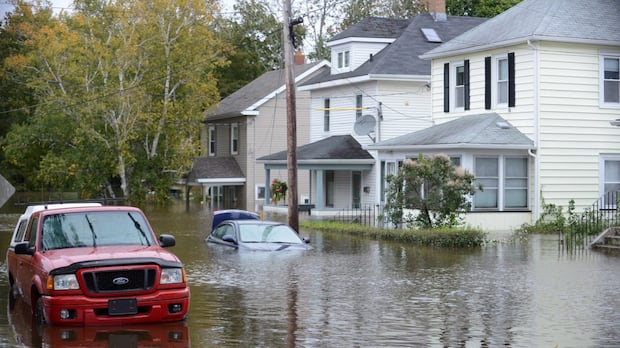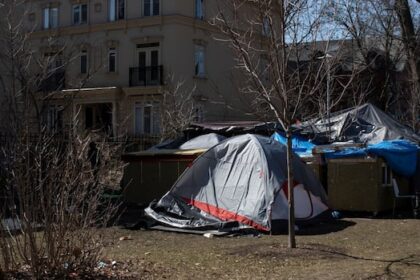Nova Scotia·NewA Dalhousie University study aims to understand what people go through when they relocate due to climate-related risks or impacts.Dalhousie University study aims to explore what people go through when they relocateFrances Willick · CBC News · Posted: Oct 11, 2025 5:00 AM EDT | Last Updated: 1 hour agoA Dalhousie University researcher is hoping to speak with Atlantic Canadians who have moved due to climate-related risks or impacts. Homes on St. Peters Road in Sydney, N.S., pictured above, were torn down after severe flooding in 2016. (Vaughan Merchant/The Canadian Press)A Dalhousie University researcher is hoping to speak with people in Atlantic Canada who have moved due to climate-related risks or impacts.Robin Willcocks-Musselman is a PhD student in the interdisciplinary program at Dalhousie who is researching what people go through when they relocate and how their attachment to a particular place plays a role in that experience.Willcocks-Musselman says researchers have looked at financial and logistical aspects of relocation, but there has not been a lot of research on the emotional, mental and psychological impacts.”We know from initial research that when these attachments break or change, there is sort of a stress or trauma or feelings of loss and grief, which then affects our mental health and well-being,” she said.”And so if we could find out more information about it, then maybe we could help with the process and limit or decrease some of the negative impacts on our health and well-being.”Robin Willcocks-Musselman is a PhD student at Dalhousie University who is researching people’s experiences of moving due to climate-related risks. (Submitted by Robin Willcocks-Musselman )There is worldwide scientific consensus that the Earth’s climate is changing and that human activity has unequivocally caused it. Climate change has resulted in more frequent and more extreme weather events, bringing higher vulnerability to hazards such as floods, fires and heatwaves.Some examples of places in Atlantic Canada where people have chosen to or were forced to move due to climate-related impacts include communities along the St. John River in New Brunswick and neighbourhoods in Sydney, N.S., where homes were made unlivable by flooding. Homes in Port aux Basques, N.L., were also lost during post-tropical storm Fiona.Sometimes, climate-related relocations are forced by disasters or mandated by government, but they can also be voluntary, as people acknowledge that their land or home is at risk.’It was traumatic’In Terry Drohan’s case, he didn’t have much of a choice.When his home along the Wash Brook in Sydney was severely damaged in the Thanksgiving flood of 2016, he had to find a new place for his family to live. After accepting a buyout from the province, he eventually moved a couple of blocks away.Terry Drohan moved from his home on St. Peters Road in Sydney, N.S., after it was damaged by floods in 2016. (CBC)But in the immediate aftermath of the flood, he was overwhelmed with loss and uncertainty.”My brain was just completely locked into being homeless,” Drohan said. “I was basically living out of a couple of garbage bags in a hotel. And so it was traumatic.”He said the impacts of his move went far beyond logistical and financial concerns such as acquiring new furniture or dealing with insurance.”Even though you may have supportive people around and even though financially you may have support to get by, deep down there’s still a traumatic experience that you’ve gone through and you know, you sort of get resilient and move on, but it’s still there. It still stays with you.”Drohan’s home was located near the Wash Brook, which flooded on Thanksgiving Day in 2016. (CBC)Drohan’s old neighbourhood on St. Peters Road was a social one, where neighbours knew each other and frequently chatted on their front steps. Kids on the street hung out together, playing and fishing in the creek, having picnics and tenting in the backyard.”The plan was to stay there forever and then all of a sudden, yeah, the plans changed,” Drohan said. “We basically lost the neighbourhood.”Although the neighbours stayed in touch for the first year or so after they dispersed, they eventually lost regular contact, Drohan said.Pointers for policymakersWillcocks-Musselman hopes her study will pinpoint some practices that can be implemented by policymakers to make life easier for people who move due to climate-related risks.Drohan said people who are forced to relocate due to disasters should be offered counselling to help deal with the changes they’re facing. They should also have access to a navigator who can help them with logistics such as dealing with insurance companies, legal concerns, government agencies and financial questions.Willcocks-Musselman is looking for people who are 19 or older, who live in the Atlantic region, and who have permanently moved due to climate risks such as sea level rise, flooding, wildfire or erosion.Participation in the study would include an online or phone interview as well as an in-person interview.So far, interviewees have been grateful for the opportunity to share their experiences, Willcocks-Musselman said.”They appreciate just having someone acknowledging, yeah, that this is a big and important thing for them.… Like, yeah, this is hard. This is emotionally and mentally hard.”Anyone wishing to participate in the study can contact Willcocks-Musselman at rwillcoc@dal.ca.MORE TOP STORIESABOUT THE AUTHORFrances Willick is a journalist with CBC Nova Scotia. Please contact her with feedback, story ideas or tips at frances.willick@cbc.ca
Have you moved due to climate risks in Atlantic Canada? This researcher wants to talk to you











